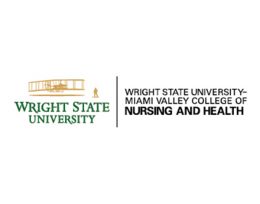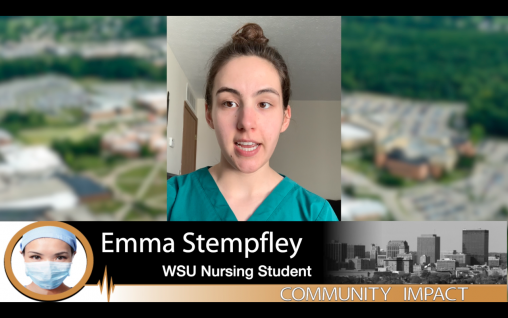 Instructional mental health videos on everything from ways to combat stress to the dangers of binge drinking are being distributed to the community thanks to a unique Wright State University partnership.
Instructional mental health videos on everything from ways to combat stress to the dangers of binge drinking are being distributed to the community thanks to a unique Wright State University partnership.
The cellphone videos were recorded by students in the College of Nursing and Health and then edited by students at the ONEIL Center at Wright State University. The project was a collaboration between Judy Ribak, associate professor of nursing, and Brandy Foster, executive director of the center.
“Our goal was to provide an experiential learning opportunity for Wright State students to do community service during the pandemic without leaving their homes,” said Foster. “Dr. Ribak was excited about collaborating and assigned her students to write scripts that could be assessed for clinical accuracy, and my students provided tips and strategies for the nursing students to film themselves at home.”
The 74-student class Critical Reasoning in Nursing Care of Individuals and Groups in Mental Health is a required clinical and didactic course for junior-standing nursing majors. The course stresses therapeutic communication and the nurse-patient relationship, skills that are transferable to all other clinical nursing courses.
As the COVID-19 pandemic began to impact the community in March, nursing faculty knew that courses would need to be modified because students not only met in face-to-face classes but also participated in practicums at hospitals and community agencies. Faculty examined opportunities that could be accomplished from home but with faculty input and supervision.
“I am an admitted technophobe, so the prospect of an online, heavy technical presence for our course was totally overwhelming for me,” said Ribak. “But the amazing Brandy Foster welcomed the partnership and took on working with me.”
Ribak and Foster developed a plan in which nursing students would create three-to-five-minute instructional videos at home by recording them on their phones. Then Foster’s students, Chris Smith and Tyler Wainwright, transformed the homemade videos into evidence-based patient support and education media available to the community. Zack Frink, Elevate Dayton’s editor-in-chief, mentored the students to ensure the videos met publishing requirements.
Topics of the videos included everything from using healthy coping strategies to combat stress and the dangers of binge drinking to the utilization of meditation and journal-writing.
“The opportunity for the students to research topics, write evidence-based scripts, advocate for health and provide these videos to the community all reinforce the principles of advocacy and teaching as critical nursing responsibilities, even in extraordinary situations,” said Ribak. “We are serving the community while empowering our students to advocate and teach and be available to the community during the pandemic.”

Emma Stempfley is one of the nursing students featured in the video series produced through a collaboration between College of Nursing and Health and the ONEIL Center.
The biggest challenge for the students was overcoming stage fright.
“None of our students reported becoming intimidated by the technology, but they were a bit reticent about recording themselves,” said Ribak. “They emerged victorious, however. They are all stars in my book.”
ONEIL students are editing the 31 videos as part of a branded series. The center has partnered with Elevate Dayton, which will distribute the videos so they will have the broadest reach within the region. The videos will be distributed throughout the summer.
Frink said he was excited to hear about the collaboration when Foster approached Elevate Dayton about distributing the videos.
“Mentoring the ONEIL Center students on videography best practices is rewarding for us and helps improve the students’ portfolios,” said Frink.
The ONEIL Center provides an innovative transdisciplinary experiential learning workspace that functions as a classroom, incubator, small business, social impact organization and research lab in a new model of workforce development. The center serves as a workforce pipeline to the Dayton region. It provides internships to students that connect them to researchers, businesses and other organizations through its services.
Ribak said that with the increased acceptance of telehealth as a mode of care delivery since the pandemic began, she anticipates continuing the project even after the students return to campus.
“This is an excellent mode of providing care that can be widely accessed, for many topics in mental health and physical health as well,” said Ribak. “This project has also served to increase the ability of our students to use the literature to support their work and also increase their confidence as advocates and teachers.”

 Wright State names Rajneesh Suri dean of Raj Soin College of Business
Wright State names Rajneesh Suri dean of Raj Soin College of Business  ‘Only in New York,’ born at Wright State
‘Only in New York,’ born at Wright State  Wright State president, Horizon League leaders welcome new commissioner
Wright State president, Horizon League leaders welcome new commissioner  Wright State celebrates homecoming with week-long block party
Wright State celebrates homecoming with week-long block party  Wright State baseball to take on Dayton Flyers at Day Air Ballpark April 15
Wright State baseball to take on Dayton Flyers at Day Air Ballpark April 15 